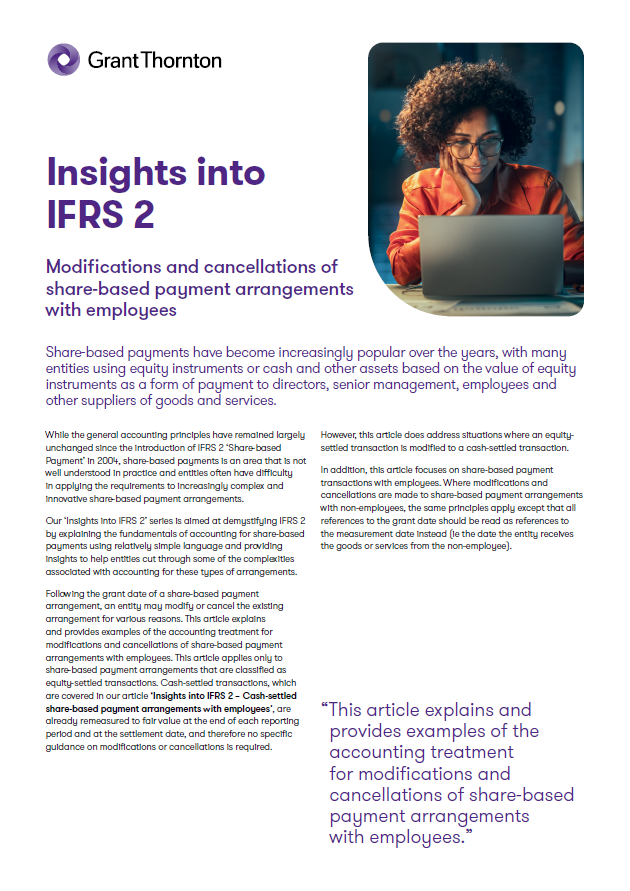-
Compliance
Assistance in the design, implementation and monitoring of Compliance programs within the framework of local and international regulations (FCPA, Corporate Criminal Responsibility Law), including course delivery.
-
Forensic
The services offer includes expert advice in litigation resolution and the development of procedures in legal/digital forensics and cybersecurity.
-
Human Capital solutions
Grant Thornton's Human Capital division has a team of professionals determined to accompany individuals and organizations throughout the relationship between the employee and the organization.
-
Organizational restructuring
Advice on operational restructuring to companies in difficulty, their creditors or other interested parties.
-
Services to the Government and the Public Sector
Financial audit projects and special technical and concurrent reviews of programs of national and subnational governments financed by International Credit Organizations. Special projects for government entities, public and mixed companies.
-
Sustainability
Learn how our sustainability services can help you go beyond and build a strong reputation, attract committed investors and generate long-term sustainable financial results.
-
Transaction Advisory Services
The service offer includes financial due Diligence, operations services, business and strategic intelligence, ratings, advice on mergers and acquisitions, capital markets and debt advice.
-
Valuation Services
We provide stock, business, asset, and liability valuations in support of negotiations, account structuring, and tax opportunities.
-
Academy - Empowered by Grant Thornton Argentina & Perú
Academy is an e-learning platform that emerged as a joint initiative of Grant Thornton Argentina and Grant Thornton Perú. It is designed so that everyone can acquire new skills in accounting, auditing, taxes, technology and business through access to multiple courses and certifications.
-
Audit methodology and technology
At Grant Thornton we use a single audit methodology across our global network. We apply it through LEAP, an integrated software audit tool. Get to know it now.
-
External audit
We offer services of external audit of financial statements, assurance reports, agreed-upon procedures reports and certifications, due-diligence and take-over of companies.
-
Prevention of money laundering and financing of terrorism
At Grant Thornton we provide advice to our clients in the development of an Asset Laundering and Terrorist Financing Prevention strategy that allows them to prevent risks in a comprehensive manner.
-
Professional standards and training
Our IFRS advisors can help you navigate the complexity of the standards so you can spend your time and effort on your business.
-
Accounting, administration and finance services
Effective accounting and financial advisory are necessary for the success of an innovative and forward-thinking organization. We provide our knowledge and experience so you can stay focused on your business's core activities.
-
Payroll
We have the experience and the know-how to perform payroll for various industries, including those in which trade unions and workers' organisations are active.
-
Start-up of companies
The early stages of a business are key to its success. Therefore, it's important to have experts who manage and administer business resources. Learn about our solutions to help you build your company.
-
Tax outsourcing
Taxes have a significant impact on business decisions. At Grant Thornton, we respond quickly and design tailored solutions to ensure organizations are not adversely affected.
-
FIU Independent External Reviewer - AML/CFT
We participate in the implementation of the requirements of the FIU in leading companies and our services ensure an orderly framework, optimizing the investment.
-
Cybersecurity
As sophisticated digital manipulations become more prevalent, organizations must strengthen their defences and effectively protect themselves from threats and recognize those that are not. Organizations must act quickly to strengthen trust and resilience. A combination of enhanced security capabilities, robust controls, and employee education and awareness is critical.
-
ITGC Controls
Information Technology General Controls (ITGC) are a set of policies that ensure the effective implementation of control systems throughout an organization. ITGC audits help verify that these general controls are implemented and functioning correctly, so that risk is appropriately managed.
-
Creation and acquisition of Financial Entities
We have the knowledge and experience in activities related to the acquisition and creation of financial entities, both locally and internationally.
-
Financial statements audit
We offer services of external audit of financial statements; assurance reports, agreed procedures and certifications; due-diligence and take-over of companies.
-
Internal audit
An internal audit helps identify gaps, deficiencies, and potential for inherent risk in all facets of the organization.
-
IT Internal Audit
IT has been, and will increasingly be, a key factor for success and operational efficiency in all industries. Innovations such as the cloud and virtualization, and new threats around data security, have reinforced the importance and increased the risks associated with the use of technology for our clients.
-
Legal audit
The monitoring of the legal area is usually a complex and difficult task for organizations, which however cannot be neglected.
-
Responsible for regulatory compliance
At Grant Thornton we offer the service of acting as "Responsible for Regulatory Compliance and Internal Control" for companies that requested registration as Settlement and Clearing Agent and Trading Agent.
-
SOC 1, SOC 2 and SOC 3 Reports
At Grant Thornton, we support our clients in obtaining SOC 1, SOC 2 and SOC 3 reports, enabling them to provide assurance to their clients and partners regarding the design, implementation and operation of adequate internal controls, highlighting the organisation’s commitment to the highest standards of control and security.
-
Services to private clients
Wherever you are in the world, our tax specialists can help you with your interests and investments abroad.
-
Global Mobility Services
Sending someone abroad involves liabilities and obligations. We offer interesting solutions to minimize the tax burden for both parties.
-
Direct Tax
We provide clear and practical solutions that meet your specific business needs, in the most tax-efficient way possible.
-
Indirect Tax
Grant Thornton's tax teams take a rigorous approach to help you meeting your tax obligations, whatever challenges you may face along the way.
-
International taxes – Transaction support
We offer our international experience in the field and make available the resources to plan and adequately comply with regulatory frameworks.
-
LATAM Tax Newsletter
Stay informed with the latest tax developments across Latin America with the LATAM Tax Newsletter, prepared by our experts throughout the Americas.
-
Clean energy and technology
Growing demand, development of new ways of energy and a need for a sustainable future: we support our clients in these changes to be one step beyond their competitors.
-
Mining
Our flexible, partner-led teams are dynamic and focused on development. We take time to understand the details of the client’s business and offer unique solutions.
-
Oil and gas
Our Oil & Gas teams have the deep knowledge, wide experience and vision needed to offer our clients practical solutions adapted to their businesses.
-
Banking
Grant Thornton offers meaningful and accurate solutions for operational and transactional issues, litigation and administrative disputes in banking.
-
Private capital
We gather international teams of experts in corporate finance, restructuring and recovery, tax and insurance services to deliver customized solutions from initial investment, through development stages until the end of each project.
-
Fintech
We work to take advantage of all opportunities and manage industry risks, allowing our clients to always be one step beyond their competitors.
-
Asset management
We have specialized teams in more than 140 markets delivering solutions regarding insurance, taxes and advisory to global, international, regional, local asset managers.
-
Insurance
Thanks to our specialized team we offer accurate solutions for operational and transactional matters, litigations and administrative conflicts.

This article explains and provides examples of the accounting treatment for modifications and cancellations of share-based payment arrangements with employees.
General principle
As we learned in our article, ‘Insights into IFRS 2 – What is IFRS 2?’, the general principle under IFRS 2 is that an entity must recognise, at a minimum, the value of the services received – measured at the grant date fair value of the equity instruments granted – unless those equity instruments do not vest because of a failure to satisfy a service condition or non-market performance condition that was specified at the grant date. This principle applies regardless of whether there has been a modification or cancellation, meaning that an entity cannot reduce the cost that it recognises under the original terms or conditions of an award by modifying or cancelling the award.
Modifications
An entity may modify one or more of the terms and conditions of a share-based arrangement, such as the exercise price, number of instruments granted or vesting conditions. A common modification is when an entity reduces the exercise price of share options in response to a declining share price, because without the reprice the effectiveness of the award as a motivator for employee retention and performance may be lost.
How should modifications be accounted for under IFRS 2?
In addition to recognising the grant date fair value in accordance with the general principle above, an entity must also recognise the effects of any modifications that increase the total fair value of a share-based payment arrangement or that are otherwise beneficial to the employee.
What types of modifications are beneficial to the employee?
IFRS 2 describes the following types of modifications that are beneficial to the employee:
- Modifications that increase the fair value of the equity instruments granted, measured immediately before and after the modification,
- Modifications that increase the number of equity instruments granted,
- Modifications to vesting conditions (other than market conditions) in a manner that is beneficial to the employee.
How should beneficial modifications be accounted for?
The below summarises the accounting treatment for the types of beneficial modifications outlined in IFRS 2 is summarized below:
- Increase in the fair value of equity instruments granted: Continue to recognise the grant date fair value of the original equity instruments over the shorter of the original vesting period remaining and the modified vesting period remaining. In addition, recognise the incremental fair value, being the difference between the fair value of the original award and fair value of the modified award (both measured at the modification date), over the remainder of the modified vesting period.
- Increase in the number of equity instruments granted: Continue to recognise the grant date fair value of the original equity instruments over the shorter of the original vesting period remaining and the modified vesting period remaining. In addition, recognise the fair value of the additional equity instruments granted, measured at the date of modification, over the remainder of the modified vesting period.
- Modification of non-market vesting conditions in a manner that is beneficial to the employee: When the service period of an award is reduced there is generally no incremental fair value at the modification date; however, typically the change is still beneficial to the employee. If so, the grant date fair value of the original equity instruments is recognised over the reduced service period (ie calculate the cumulative amount to be recognised at each period end based on the elapsed portion of the new service period).
For modifications of other non-market performance conditions beneficial to the employee, the modification date fair value is not impacted. Instead, account for the effects of the modification using the modified grant date method – ie by using the original grant date fair value but adjusting the number of equity instruments expected to vest under the modified nonmarket performance conditions.
Where beneficial modifications give rise to additional amounts to be recognised (ie as a result of an increase in fair value or an increase in the number of equity instruments granted), those additional amounts shall be recognised as follows:
- If the modification occurs during the vesting period, recognise the incremental fair value granted over the period from the modification date until the date that the modified equity instruments vest.
- If the modification occurs after the vesting period, recognise the incremental fair value granted immediately, or over the additional vesting period if the employee is required to complete an additional period of service before becoming unconditionally entitled to the modified equity instruments.
How should modifications that are not beneficial to the employee be accounted for?
The accounting treatment for the types of modifications that are not beneficial outlined in IFRS 2 is summarized below:
- Decrease in fair value of the equity instruments granted: Continue to recognise the grant date fair value of the original equity instruments over the remainder of the original vesting period and ignore the effect of the decrease in the fair value of the equity instrument.
- Decrease in the number of equity instruments granted: Recognise the reduced number of equity instruments as a cancellation (see below for a discussion of the accounting treatment for cancellations).
- Modification of non-market vesting conditions in a manner that is not beneficial to the employee: Continue to recognise the grant date fair value of the original equity instruments over the remainder of the original vesting period. The effects of the non-beneficial modifications to nonmarket vesting conditions are disregarded.
Multiple modifications
An entity may make multiple modifications to the terms of a share-based payment award that result in the total fair value of the arrangement changing. Some of the changes may be favourable to the employee, while other changes are not (eg when an entity reduces the exercise price of a share option award, but also extends the vesting period).
When there are multiple modifications to a share-based payment award, the following are some of the approaches observed in practice for determining whether the modifications are beneficial to the employee:
- Treat the unit of account for the modifications as the total award: consider the net effects of all modifications to determine whether the combined effect is favourable (ie where the combined modifications result in an increase to the total fair value of a share-based payment arrangement, the entity would account for the net increase in fair value as a beneficial modification), or
- Treat the unit of account for the modifications as each individual award if the number of equity instruments is reduced but there are other changes such that the total fair value remains the same or increases. If the unit of account is considered to be each individual award, the entity may apply a policy to either:
-
- account for the modification as a cancellation of a portion of the award and an increase in fair value of the remaining awards, or
- consider the net effect of all modifications and account for the changes as a beneficial modification (same outcome as treating the unit of account as the total award).
Modifications that give rise to a change in method of settlement
A modification may also give rise to a change in the method of settlement. For example, an equity-settled award may become cash-settled (or vice versa).
Accounting for changes from equity-settled to cash-settled award
IFRS 2 does not provide guidance on how to account for modifications that result in the classification of an award being changed from equity-settled to cash-settled. However, it does provide illustrative guidance on how to account for an equity-settled award that is subsequently modified to contain a cash alternative. This example can, by analogy, be applied in determining the treatment for a change from an equity-settled to a cash-settled award.
The change in the method of settlement (ie from equity-settled to cash-settled, or with a cash alternative added) constitutes a modification if the change was not specified as part of the agreement at the grant date, or if the entity triggers the change (eg by changing its past practice of settling in equity to settling in cash instead, when it has a choice of the settlement method).
The general principle of modification accounting continues to be applied, where the entity shall at a minimum, recognise the value of services received measured at the grant date fair value of the original instruments over the original vesting period irrespective of the modification, unless the instruments do not vest because of the failure to satisfy a vesting condition (other than a market condition that was specified at grant date).
At the date of modification, the entity recognises a liability for the cash alternative at an amount equal to the fair value of the liability at the date of modification, to the extent the specified services have been received. The liability is then remeasured from the date of modification until the date of settlement, with any changes in fair value recognised in profit or loss.
Accounting for changes from cash-settled to equity-settled award
When an entity modifies a share-based payment award such that a cash-settled award becomes classified as an equity-settled award, the entity:
- Measures the equity-settled award at fair value on the modification date, recognising in equity an amount based on the extent of services that have been received;
- Derecognises the liability for the cash-settled award at the modification date; and
- Immediately recognises any difference between the carrying amount of the liability derecognised and the amount of equity recognised on the modification date in profit or loss.
This treatment shall also be applied where an equity instrument is identified as a replacement for a cancelled cash-settled award.
Cancellations and settlements
How should a cancellation be accounted for?
When a share-based payment arrangement is cancelled or settled during the vesting period, an entity accounts for it as an acceleration of any unvested portion of the share-based payment on cancellation – that is, any remaining amount that would have otherwise been recognised over the remainder of the vesting period shall be recognised immediately in profit or loss.
IFRS 2 is unclear on whether the amount that would have otherwise been recognised over the remainder of the vesting period should reflect:
- the maximum number of options that could have vested under the arrangement (eg if an entity cancels a share-based payment arrangement whereby it granted 100 options to 100 employees subject to a service condition of three years, the total amount that could have vested is 100 options x 100 employees x grant date fair value of the option, regardless of the number of options that the entity expects will ultimately vest); or
- the number of equity instruments that the entity ultimately expects will vest at the date of cancellation (eg if an entity cancels a share-based payment arrangement whereby it granted 100 options to 100 employees subject to a service condition of three years and where it expected that only 80 employees will remain employed at the end of year three, the total amount that is ultimately expected to vest is 100 options x 80 employees x grant date fair value of the options).
In our view, it is appropriate for an entity to make an accounting policy choice to account for cancellations under either one of the two approaches listed above. However, this policy should be applied consistently across all share-based payment arrangements.
How should payments made as compensation for the cancellation of share-based payment arrangements be accounted for?
When an entity compensates employees for the cancellation of an award, it recognises the unvested portion of the share-based payment immediately as described above. Additionally, the compensation payment is treated as the repurchase of an equity interest and is deducted from equity, except to the extent that the payment exceeds the fair value of the equity instruments granted, measured at the repurchase date. Any such excess is recognised as an expense.
However, if the share-based payment arrangement included liability components, the entity shall remeasure the fair value of the liability at the date of cancellation or settlement. Any payment made to settle the liability component shall be accounted for as an extinguishment of the liability.
How should replacement share-based payment arrangements be accounted for?
An entity may, upon cancelling an existing award, grant new equity instruments to employees. If the entity has designated these new equity instruments – on their grant date – as a replacement award for the cancelled award, the replacement award is accounted for as a modification to the existing agreement as discussed above.
The entity continues to expense amounts relating to the original award over the original vesting period as well as any incremental fair value, calculated as the difference in fair value between the original and replacement awards both measured at the date of modification (ie the date the replacement awards are issued). The fair value of the original awards that have been cancelled is their fair value, immediately before cancellation, less the amount of any payment made to the employee on cancellation that is accounted for as a deduction from equity.
If the entity does not determine that the new equity instruments have been granted as a replacement for the cancelled instruments, the new equity instruments are accounted for as a new grant.
Business combinations
In a business combination, the acquirer often issues new share-based payment awards to the acquiree’s employees to replace their existing awards. The accounting for these replacement awards is covered in IFRS 3 ‘Business combinations’ and differs depending on whether the acquirer was obliged to replace the awards or voluntarily chooses to replace the awards.
An acquirer is obliged to replace the awards if the acquiree or its employees have the ability to enforce replacement. This is often as a result of the terms of the acquisition agreement, the terms of the acquiree’s awards, or due to applicable laws or regulations.
How we can help
We hope you find the information in this article helpful in giving you some insight into IFRS 2. If you have a complex scenario or you would like to discuss any of the points raised, contact us.






